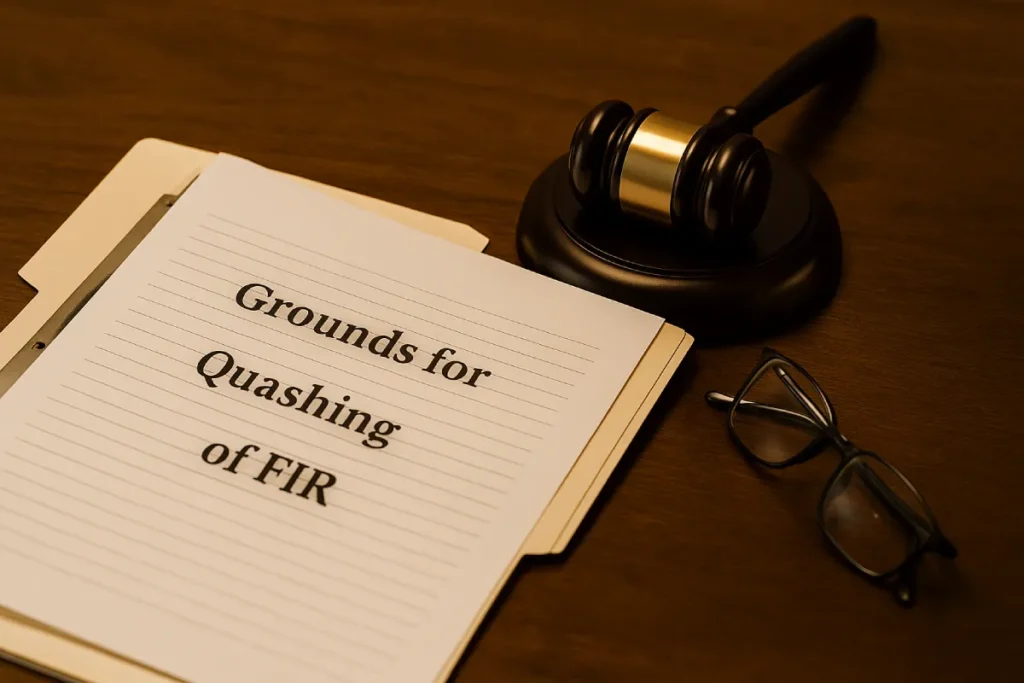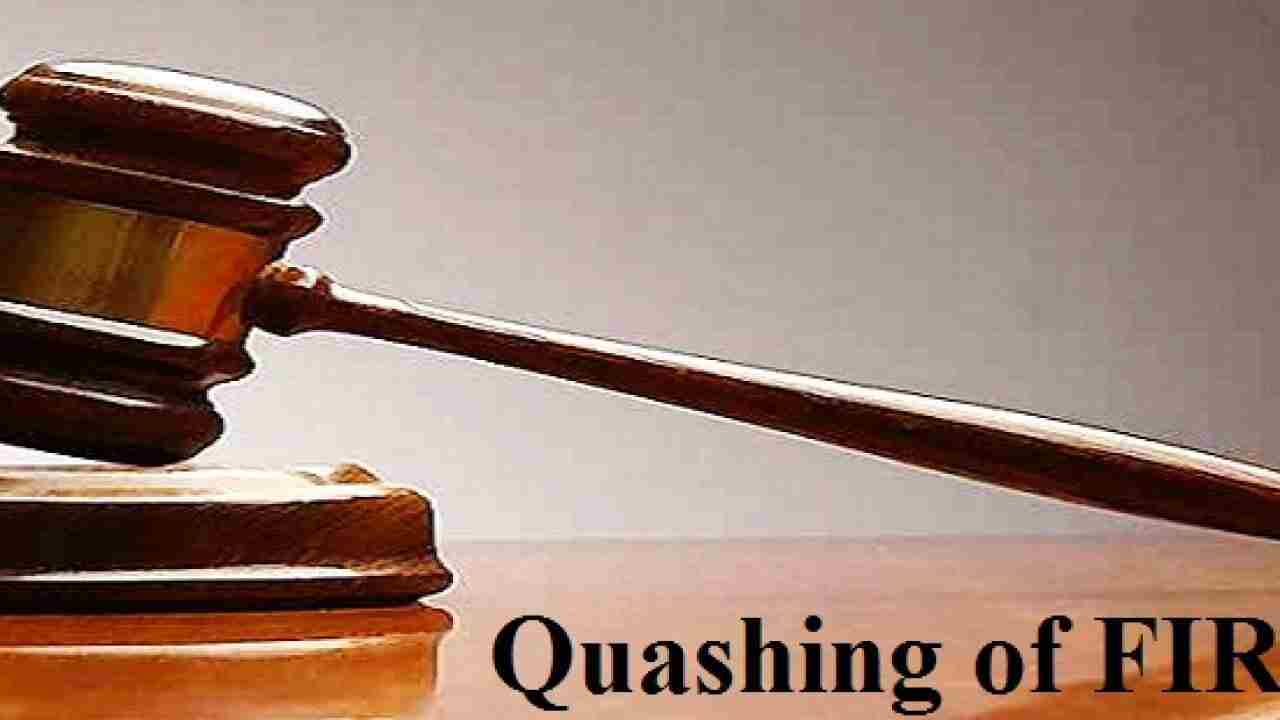
Step‑by‑Step Process to Quash an FIR in High Court
A comprehensive legal guide to understanding when, why, and how to get an FIR quashed in the High Court—ensuring your rights are protected under Indian law.

Table of Contents
- Introduction: Why Quashing an FIR Matters
- Legal Basis: Section 482 and Article 226
- When Can You Ask the High Court to Quash an FIR?
- Key Supreme Court Guidelines
- Preparing the Quash Petition & Documents
- Procedural Roadmap: Step by Step
- Burden of Proof & Common Defense Points
- What If the High Court Denies Quashing?
- Alternate Remedies: Anticipatory Bail & CBI Appeals
- Choose the Right Lawyer
- Final Tips & Precautions
Introduction: Why Quashing an FIR Matters
An FIR (First Information Report) is the spark that ignites criminal proceedings—it starts investigations, arrests, court summons, and often irreversible reputational harm. When such an FIR is baseless, frivolous, or maliciously filed, it can derail your life and livelihood.
Quashing an FIR means asking a High Court to nullify or dismiss it before the trial even begins. This isn’t just a technicality—it’s a lifeline. If successful, the entire criminal machinery collapses, and your name is cleared on paper.
- Prevention of harassment: Stops unwarranted police actions like raids or arrests.
- Reputational shield: Avoids courtroom stigma and protects your public image.
- Financial relief: Saves legal fees, bail expenses, and economic loss ahead of trials.
Understanding when and how to use this remedy is critical. The path is narrow, strict, and rooted in constitutional provisions—yet extremely powerful in the right hands.
Legal Basis: Section 482 & Article 226
The authority to quash an FIR in High Court comes from two powerful judicial tools:
- Section 482, CrPC: Empowers courts to prevent misuse of the criminal justice system, to secure the ends of justice.
- Article 226, Constitution: Enables High Courts to enforce fundamental rights, which includes protecting citizens from baseless prosecutions.
Combined, these provisions place a strict check on arbitrary FIRs—allowing High Courts to stop criminal proceedings in their tracks.
When Can You Ask the High Court to Quash an FIR?
Not every FIR qualifies. Courts have drawn bright lines around when quashing is appropriate:
- No prima facie case: Police file FIR without sufficient facts or evidence supporting the alleged crime.
- Malicious or vexatious aims: FIR lodged to harass, intimidate, or silence someone.
- Absence of cognizable offence: The alleged act—even if true—does not constitute an offence that allows FIR registration.
- Violation of procedure: FIR filed after undue delay or without jurisdiction or proper verification.
- Settlement under compromise: In non‑compoundable offences where compromise is allowed, and parties reconcile.
Courts look at substance, not form. If the matter should not go to court in the first place, quashing might be granted.
Key Supreme Court Guidelines
The Supreme Court of India has laid down strong judicial guidelines that act as a compass for High Courts while dealing with FIR quashing petitions. Some landmark judgments include:
- State of Haryana vs Bhajan Lal (1992): Laid down 7 specific grounds where quashing is permissible.
- Gian Singh vs State of Punjab (2012): Allowed quashing even in non-compoundable offences if parties have settled and no societal harm is done.
- Narinder Singh vs State of Punjab (2014): Encouraged High Courts to consider the interest of justice and not only technical legality.
These cases empower individuals who are wrongly dragged into criminal matters to seek relief at the High Court level—without facing a full-fledged criminal trial.
Preparing the Quash Petition & Documents
Drafting a quashing petition requires attention to legal detail, factual accuracy, and persuasive argument. Courts do not entertain vague or incomplete petitions.
- Petitioner details: Include full name, age, address, and contact of the person seeking quashing.
- Respondents: Mention the State, Investigating Officer, and complainant (if required).
- FIR details: FIR number, police station, sections invoked, and date of registration.
- Grounds for quashing: Bullet points showing how the FIR is false, illegal, or malicious.
- Annexures: FIR copy, statements, documents showing compromise (if any), bail order, etc.
Affidavits and Vakalatnama must also be filed by the advocate representing the petitioner.
Procedural Roadmap: Step by Step
Here’s a structured overview of how the process unfolds once you decide to file a quash petition in the High Court:
Step 1: Legal Consultation
- Hire a criminal lawyer experienced in High Court matters.
- Explain the full facts of the case, share FIR and evidence.
- Discuss whether the facts match the Supreme Court grounds for quashing.
Step 2: Drafting the Petition
- Prepare a well-drafted petition with clear legal grounds.
- Annex certified copies of FIR, charge sheet (if filed), and relevant documents.
- If it’s a compromise case, notarized affidavits of all parties involved are required.
Step 3: Filing in High Court
- The petition is filed before the jurisdictional High Court under Section 482 CrPC.
- It is listed before a bench for hearing. Notice is issued to the State and complainant.
- The State files a reply, and oral arguments are heard.
Step 4: Court Decision
- If satisfied that the FIR is misuse of process, the court will quash it.
- If facts show a cognizable offence, the court may refuse and suggest trial.
- In compromise cases, courts often allow quashing if parties have resolved the issue.
The entire process may take 3–6 months depending on the High Court’s schedule and urgency of the matter. Interim protection can also be sought during the pendency of the case.
Burden of Proof & Common Defense Points
Unlike criminal trials, where the State must prove guilt beyond doubt, quashing petitions work differently. Here, the burden is on the petitioner to show the FIR is baseless or amounts to abuse of law.
Some common arguments used by petitioners include:
- The allegations are purely civil in nature, but framed as criminal to harass.
- The complainant has no personal knowledge of the incident.
- The FIR is an afterthought—filed after a delay with no justification.
- Charges are vague, no specific role assigned to the accused.
- The accused was not even present at the time of the alleged incident.
These points, supported by documents or affidavits, help build a solid case for quashing at the pre-trial stage.
What If the High Court Denies Quashing?
If the High Court refuses to quash the FIR, don’t panic. It doesn’t mean you’re guilty. It simply means the court feels the case needs to be tried fully before a lower court. Here’s what you can do:
- Apply for bail: Anticipatory or regular bail can protect you from arrest.
- File discharge application: Ask the trial court to discharge you if no case is made out.
- Challenge in Supreme Court: You can still approach the apex court if a grave injustice has occurred.
The legal journey may get longer, but your rights remain intact. Experienced criminal lawyers can guide your next best move.
Alternate Remedies: Anticipatory Bail & CBI Appeals
Quashing is one of many legal weapons. If the situation calls for it, you may consider these alternatives:
- Anticipatory Bail: Protect yourself from arrest during investigation or trial.
- Regular Bail: If arrested, apply for bail from the Sessions or High Court.
- Filing Counter-Case: In case of false FIRs, file a complaint against the complainant.
- CBI or higher investigation: If police investigation is biased or corrupt, request transfer to a higher agency.
The key is strategic legal planning. Your lawyer should assess all options before recommending the best path forward.
Choose the Right Lawyer
Quashing an FIR is a delicate art—it’s not just about reading the law but interpreting it boldly in your favor. Choose a lawyer who has:
- Experience with High Court criminal matters
- A proven track record in FIR quashing
- Strong drafting skills for petitions and affidavits
- Good relationship with the court registry and bench
Don’t settle for a generalist. Criminal procedure is highly technical, and the right lawyer can make all the difference between freedom and frustration.
Final Tips & Precautions
Before filing, take care of these practical yet powerful pointers:
- Don’t ignore the FIR: Delaying legal action can reduce your chances of success.
- Don’t engage with the complainant directly: It may be misused against you.
- Save all communication: WhatsApp chats, emails, call logs may support your defense.
- Stay calm: A criminal case doesn’t make you a criminal. Let the law speak.
Whether it’s a property dispute, false dowry case, work-related FIR, or political vendetta—know this: You are not helpless. The High Court has your back, if your case is genuine.
We’re With You: Advocate Ace Legal Support Across Gujarat
No matter which city you live in—justice is just a step away. Our expert legal teams are ready to assist you in:
Conclusion: Don’t Let a False FIR Define You
The law offers powerful protection for those who are wrongly accused. A false FIR can be devastating, but you don’t have to wait till trial to clear your name. The High Court, under Section 482 CrPC, has the authority to stop injustice before it snowballs into a prolonged legal war.
Get legal help. Stand firm. Protect your name.
The right guidance can get that FIR quashed—and your peace of mind restored.
Need Help? We’re Just a Click Away
If you’re facing a false FIR or police complaint, Advocate Ace can help you file a quash petition in the Gujarat High Court or any other jurisdiction. Book a legal consultation now.
Talk to a Criminal Advocate NowSelect Your Legal Problem
🧑⚖️
Our Verified Legal Experts
Have questions about your case? Talk Directly to Our Lawyers! Our verified advocates are here to guide you with honest, expert legal advice.
🤝 ⚖️






